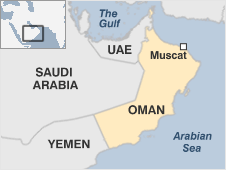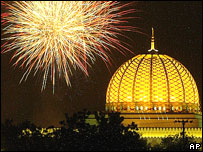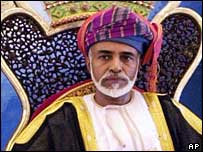 |
The oldest independent state in the Arab world, Oman is one of the more traditional countries in the Gulf region and was, until the 1970s, one of the most isolated.
Occupying the south-east corner of the Arabian peninsula, it has a
strategically important position at the mouth of the Gulf.
At one time Oman had its own empire, which at its peak in the 19th century stretched down the east African coast and vied with Portugal and Britain for influence in the Gulf and Indian Ocean.
Overview
Oman under Sultan Said bin Taimur, who came to power in 1938, experienced decades of international isolation, a society run along feudal lines and internal rebellion.
AT-A-GLANCE
 Politics: Sultan Qaboos seized power in 1970 and rules by decree; he has moved to increase popular participation in decision making
Economy: Oman is heavily dependent on oil; a diversification drive includes tourism; the policy of Omanisation aims to replace expatriate workers with locals
International: Oman is a long-standing US ally; there is a free trade agreement between the two countries
|
After deposing his father in 1970, Sultan Qaboos Bin Said opened up the country, embarked on economic reforms and boosted spending on health, education and welfare.
As with other Gulf nations, oil is the mainstay of the economy, providing a large chunk of GDP, but compared to its neighbours Oman is a modest producer. Agriculture and fishing are important sources of income.
Tourism, another source of revenue, is on the rise. Oman's attractions include a largely-untouched coastline, mountains, deserts and the burgeoning capital Muscat, with its forts, palaces and old walled city.
Most Omanis follow the Ibadi sect of Islam - the only remaining expression of Kharijism, which was created as a result of one of the first schisms within the religion.
The country has so far been spared the militant Islamist violence that has plagued some of its neighbours.
Facts
- Full name: Sultanate of Oman
- Population: 2.8 million (UN, 2009)
- Capital: Muscat
- Area: 309,500 sq km (119,500 sq miles)
- Major language: Arabic
- Major religion: Islam
- Life expectancy: 74 years (men), 77 years (women) (UN)
- Monetary unit: 1 Rial = 1000 biaza
- Main export: Oil
- GNI per capita: US $12,270 (World Bank, 2008)
- Internet domain: .om
- International dialling code: +968
Leaders
Sultan, prime minister, foreign minister: Qaboos Bin Said Al Said
Sultan Qaboos seized power in a coup against his father, Said Bin Taimur, in 1970.

Sultan Qaboos opened up Oman after years of isolationism
|
As sultan, he took on the role of prime minister and heads the foreign, defence and finance ministries.
His policies have proved popular in spite of the lack of a democratic government. He instigated the use of oil revenues to develop the country's infrastructure and modernised the government structure with the establishment of a Consultative Assembly in 1981, replaced by the Consultative Council - the majlis al-shura - in 1990 and the Council of State in 1997.
However, all important decisions are still made by the sultan.
Media
The government operates Oman's main broadcasters. The first private radio station launched in May 2007.
The use of satellite dishes is permitted, and stations from Saudi Arabia, the UAE and Yemen may be picked up. The BBC broadcasts on FM in Salalah, in the south.
A press act allows the government to censor publications for political or cultural reasons.
There are more than 20 publications, including dailies and weeklies.
The Press
- Al-Watan - daily
- Oman Daily - Arabic-language daily
- Oman Observer - English-language
- Times of Oman - English-language
Television
- Oman TV - state-run
Radio
- Radio Oman - state-run, operates Arabic and English-language networks
- Hala FM - private, Arabic music
- Al-Wisal - private, Arabic music
- Hi FM - private, English-language
News agency
-
Oman News Agency
AFRICA | ASIA-PACIFIC | AMERICAS | EUROPE | MIDDLEEAST | SOUTHASIA
Mauritania Mauritius Morocco Mozambique Namibia Niger Nigeria Republic-of-congo Rwanda Sao-tome-and-principe Senegal Seychelles Sierra-leone Somalia South-africa Sudan Swaziland Tanzania The-gambia Togo Tunisia Uganda zambia Zimbabwe Australia Brunei Burma Cambodia China East-timor Fiji Indonesia Japan Kazakhstan Kiribati Kyrgyzstan Laos Malaysia Marshall-islands Micronesia Mongolia Nauru New-zealand North-korea Palau Papua-new-guinea Samoa Singapore Solomon-islands South-korea Taiwan Tajikistan Thailand The-philippines Tonga Turkmenistan Tuvalu Uzbekistan Vanuatu Vietnam Antigua-and-barbuda Argentina Bahamas Barbados Belize Bolivia Brazil Canada Chile Colombia Costa-rica Cuba Dominica Dominican-republic Ecuador El-salvador Grenada Guatemala GuyanaHaiti Honduras Jamaica Mexico Nicaragua Panama Paraguay Peru St-kitts-and-nevis St-lucia St-vincent-and-the-grenadines Suriname Trinidad-and-tobago United-states-of-america Uruguay Venezuela Albania Andorra Armenia Austria Azerbaijan Belarus Belgium Bosnia-hercegovina Bulgaria Croatia Cyprus Czech-republic Denmark Estonia Finland France Georgia Germany Greece Hungary Iceland Ireland Italy Latvia Liechtenstein Lithuania Luxembourg Macedonia Malta Moldova Monaco Montenegro Norway Poland Portugal Russia San-marino Serbia Slovakia Slovenia Spain Sweden Switzerland The-netherlands Turkey Ukraine United-kingdom Vatican Algeria Egypt Iran Iraq Israel-and-palestinian-territories Jordan Kuwait Lebanon Libya Mauritania Oman Saudi-arabia Sudan Syria Tunisia United-arab-emirates Yemen Afghanistan Bangladesh Bhutan India Nepal Pakistan Sri-Lanka The-Maldives

